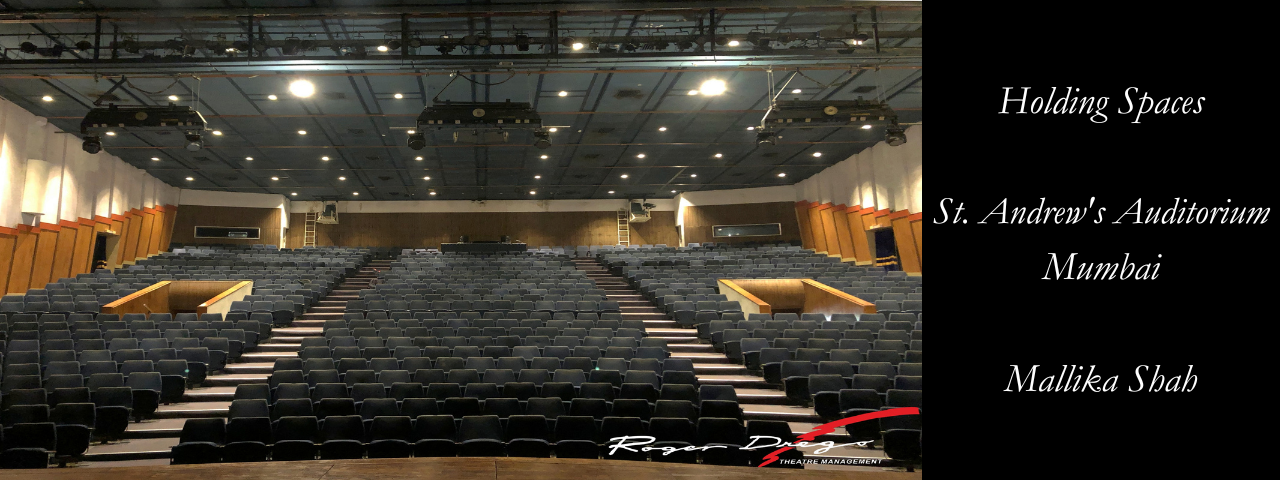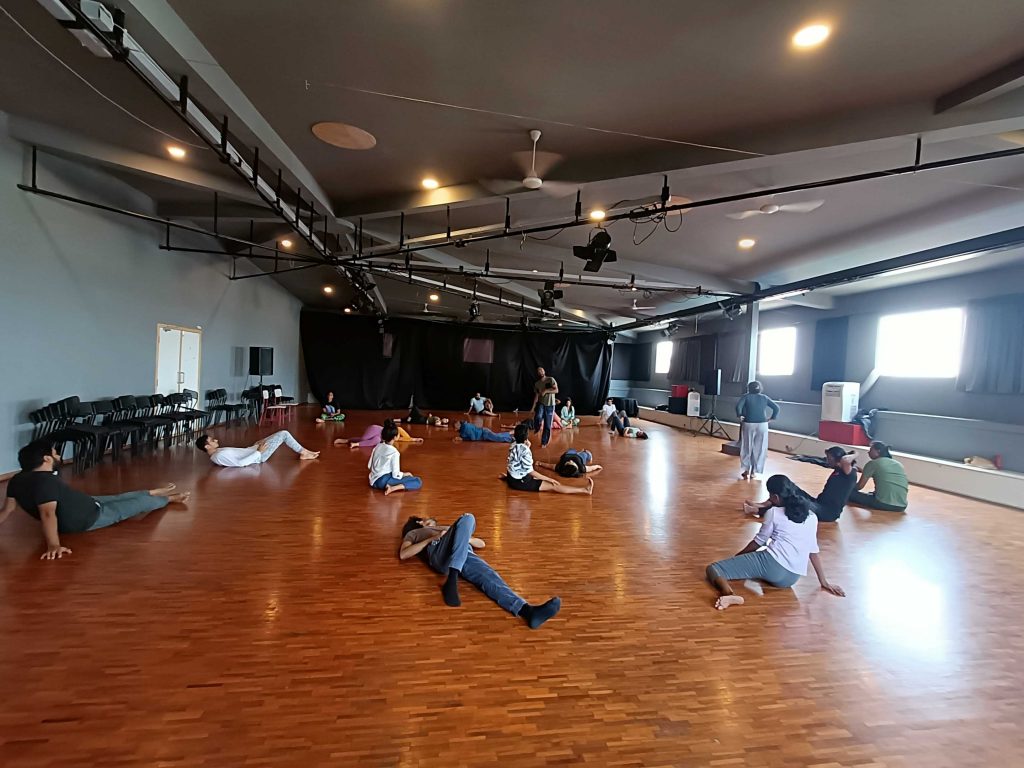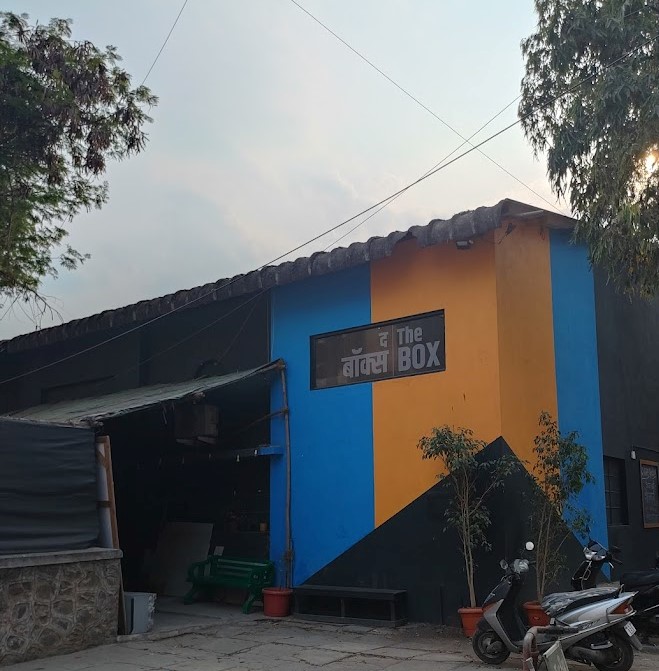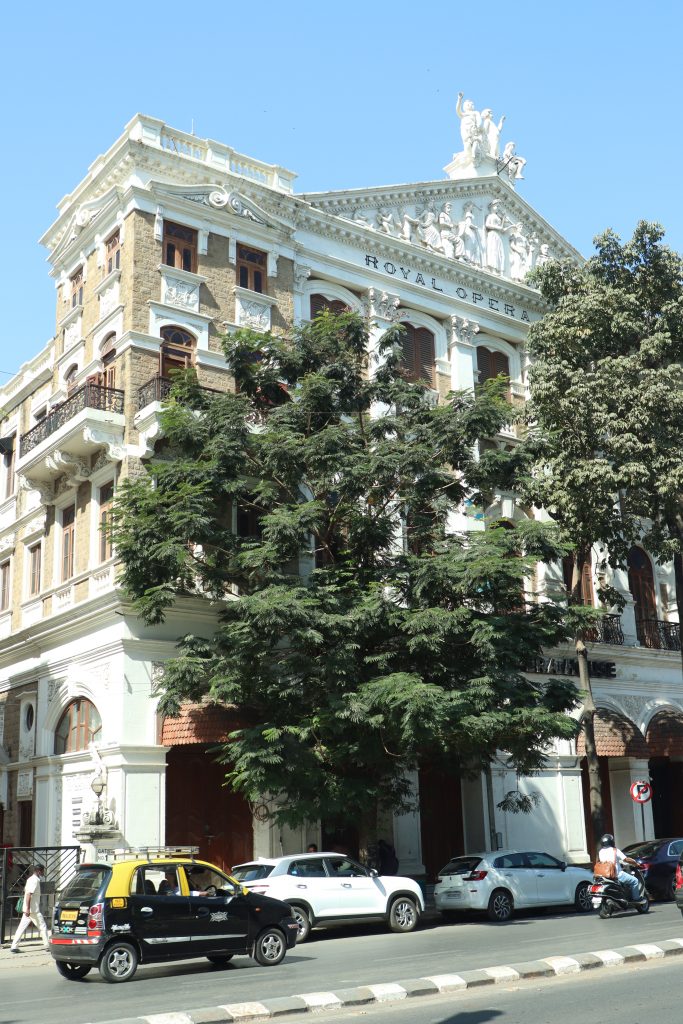There is a lot of weight given today to holding space. In the context of social or professional circles, holding space for others is being seen as a crucial aspect of care, of balance, of the health and well-being of a society or community and the people it encompasses.
We’re tweaking this sentiment – and mixing metaphors while we’re at it! – to turn the spotlight on to people who hold our beloved physical spaces for us. They’re there before us and they stay much after, they’re at work on holidays, during all kinds of festivals and lately, even during a global pandemic.
This time, Mallika Shah visited St. Andrew’s Auditorium in Bandra, Mumbai.
How do you remember a space? Forgotten memories always rush back in whenever I return to places from the past. Very suddenly, I can remember snippets of small talk, the weather during my last visit, and how I felt.
I visited St. Andrew’s Auditorium last week. This behemoth of a theatre is very much etched into my childhood and adolescent memory. I remember many school annual days, dancing badly on stage, waiting “backstage” for hours in the college’s classrooms as 500 children shouted and teachers sweated, being in the audience for plays, stand-up, and dances…
I walked in, welcoming the familiarity. Nestled between old and new buildings in Bandra West, St. Andrew’s is a refuge. There is so much space to breathe, the college makes you feel youthful as soon as you walk in, and you realise that this more than 800-seater auditorium has been running itself successfully for decades… It was built in the year I was born!
St. Andrew’s Auditorium, Bandra West
But who holds this space and gives it its charm and reputation? I walk into the office to meet Linus Rebello who is part of the accounts team. Linus hears I’m conducting staff interviews for an article and leaves me to gather up the team, and very soon, there is a kind of innocent excitement in the air.
Tulsiram Solanki is already in the office taking shelter from the summer heat. Part of the custodial staff, he has been working at Andrews for the past 23 years since his brother-in-law got him a job after the passing of his father. Without his father, Tulsi had to start earning money to support his family. He ponders that if his father had not died when he did, “This year, I would have been a banker for 23 years.” It must be a difficult what-if for Tulsi to express and remember in a country where caste and class identity percolate into every industry, community, and relationship. I ask him what he thinks of the business of theatre — what does it mean for Tulsi to be part of an ecosystem that celebrates celebrity and stardom, even though he never gets to experience that same recognition? His response, “Theatre is my rozi-roti. I have to take my job seriously and understand that if I was missing from my role, nobody else would be able to do theirs.” There is humility, wisdom, and self-preservation in his response that makes me feel ashamed of my question. It is clear that Tulsi is very attached to his workplace. He speaks very fondly of his boss and his team members — Sitaram, Don, and Pinky. Together, the four of them maintain the auditorium and its campus diligently everyday. The atmosphere in that little office is so warm and open — in those moments, I wanted to apply for a job and work there for the next 23 years.
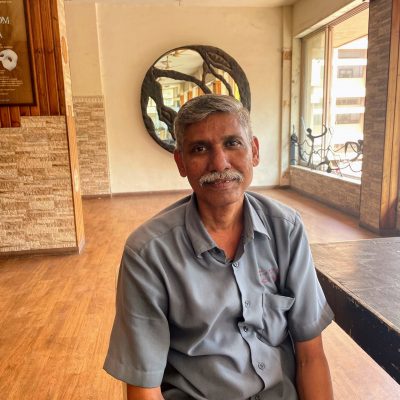

When Linus comes back, Tulsi slips away. Linus describes St. Andrew’s to be “the heart of the town,” a venue that caters to all types of shows and people. When he was young, he acted in competitions with his church youth group, but otherwise had no experience of working in the performing arts industry before. When he returned to India from the Gulf, his friend helped him in his job search, and brought him to Andrews where has now been for 16 years.
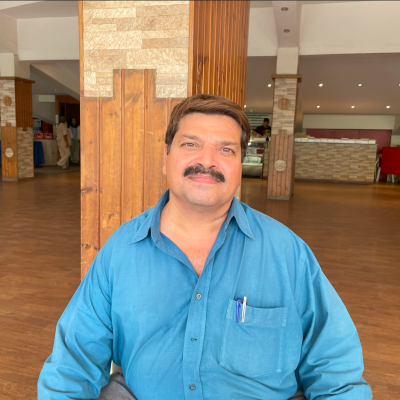
Just as I am speaking to Linus about the accounts team, Lavena and Sunil walk in. Lavena is a jack-of-all-trades at St. Andrew’s, crunching numbers, managing bookings, imports and exports for RD equipment; she is quite literally a superhuman. Her colleague, Sunil Fernandes aptly describes Lavena as the spirit of St. Andrew’s. She represents a culture where, “Everybody is there for each other, and though we all have our own roles, we are able to step in for each other and do everything that is needed.” This testament reflects in how the space operates — jobs are clearly defined, while also leaving space for openness, communication, and respect towards each other.

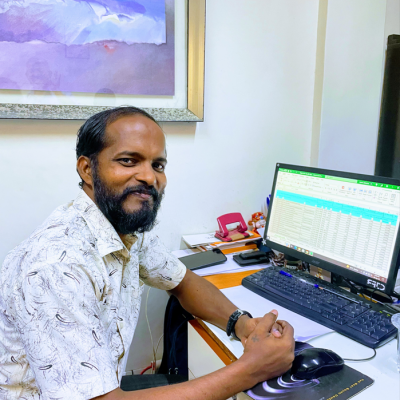
The office gets fuller. Calls are made and engineers come down from their tech booths, bringing a (short!) pause to the on-going rehearsal in the auditorium. Shailesh Nagda is a young audio engineer from Ahmedabad and we speak entirely in Gujarati. He got into music at a young age when he and his father would play garba and end up watching the band more than dancing. St. Andrew’s was an allure for him because of the venue’s connection to Roger Drego, the main man behind St. Andrew’s Auditorium and Roger Drego Pro Audio Equipment. Nikhil Salvi, another audio engineer in the team credits Roger Drego as the reason so many aspiring audio engineers come to Andrews. “People want to learn from him,” finding fulfilling and challenging work in setting up and operating live sound at the auditorium, which becomes a stepping stone to a lot of career opportunities.
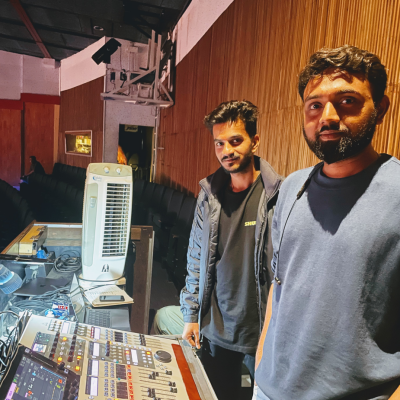
Because of its association with Roger Drego Sound, St. Andrew’s is regularly updated with state-of-the-art audio and lighting equipment. Sandeep Kalbhor, lighting engineer of the past 18 years reflects on how equipment has changed over the years. With new rigging equipment, he says that it’s easier to hang and focus lights now, “but programming lights at the console has become a bigger job.” Sandeep’s father worked as a sound engineer in a government-run theatre, and Sandeep too started working at St. Andrew’s with the intention of being in sound. Now Sandeep has two sons of his own; Arnav, who is in kindergarten, begs Sandeep to bring him to work everyday.
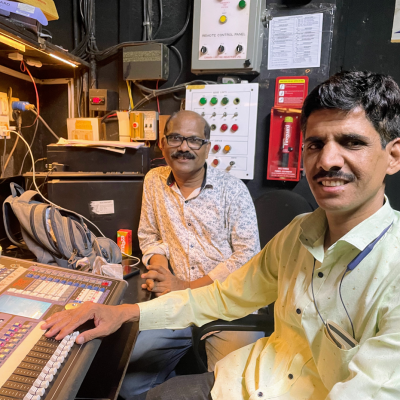
Denis D’mello is the venue manager at St. Andrew’s, and this whole time, he has been sitting at his desk in the office, encouraging and joking with the staff to help them open up and ease awkwardness. He even tricks me into leaving the office so that he wouldn’t have to be interviewed in front of everyone else! When I ask him what his job is, he says, “I need to provide for my team, and advocate for my team.” After a long career spanning India and Saudi Arabia, jobs in industries of aluminium, F&B, and hospitality, Denis tells me with unconcealed mirth about how he went from managing 125 rooms in a hotel to managing a single auditorium. “I do all my work on this,” showing me the calendar app on his phone which has bookings all the way up to 2024. When speaking about what St. Andrew’s Auditorium stands for, he says very proudly, “I keep my team happy because that’s what makes people come back whether as clients or as audiences.” Inside the auditorium rehearsals are on-going for the NGO Akanksha Foundation’s annual day. Each client’s needs are considered, and the management helps subsidise rates, or cuts technical costs for those companies that have smaller budgets.
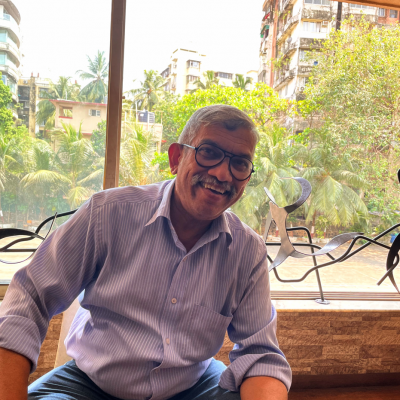
As I am leaving the office, I am introduced to Shailesh Pereira, Roger Drego’s right-hand-man. He is infectious in his positivity, and it shows in his interactions with all his colleagues. Saying goodbye to him, I feel overwhelmed with the care and sheer joy that echoed through the open foyer, the office, and the auditorium.
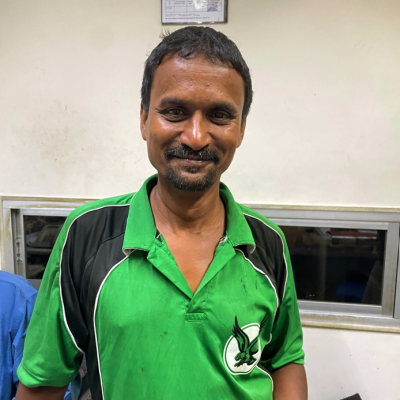
St. Andrew’s is a hallowed venue for a reason. It is the staff who — be it for 3 years or 23 — have loved and held their space with complete ownership and unabashed belonging. The next time you visit, say hello to Tulsi or look back at the sound and light booths, and take a moment to recognize all the people who keep the theatre going, come rain or sun, every single day.
–
Mallika Shah is a writer, director, and actor based out of Mumbai. She has trained at the Drama School Mumbai, works as an educator with tafreehwale at various schools, and explores different facets of theatre-making with a range of collaborators.
This piece was commissioned by Bhasha Centre under the series Holding Spaces.


